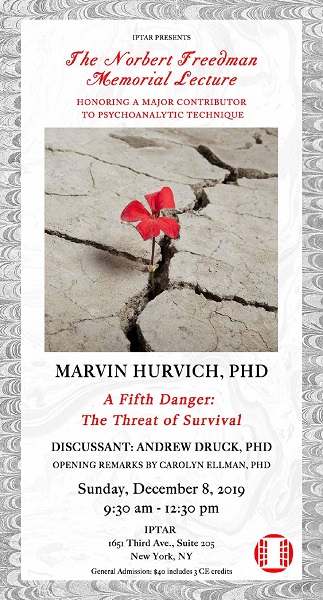IPTAR PRESENTS The Norbert Freedman Memorial Lecture Honoring a Major Contributor to Psychoanalytic Technique
A Fifth Danger: Threat to Survival Marvin Hurvich, PhD Discussant: Andrew Druck, PhD Opening Remarks by Carolyn Ellman, PhD
December 8, 2019 9:30 am – 12:30 pm IPTAR, 1651 Third Ave, suite 205
Register here:
ADMISSION: General: $40.00 includes 3 CE credits
PROGRAM
9:30 — 10:00 am BREAKFAST
10:00 — 10:15 am Carolyn Ellman, PhD, opening remarks
10:15 — 11:15 am Marvin Hurvich, PhD
Threats to survival are often associated with failure of ego functioning and loss of the coherence of the self. Catastrophic states of mind can, in turn, trigger severe primitive anxieties, and vice versa. These include panic attacks, nightmares, fulminating psychoses, suicidal crises, psychic trauma; all of which, along with related apprehensions, often reflect the dread of annihilation. In this presentation, I propose that these threats cover concerns that go beyond Freud’s four typical dangers (viz. loss of the object, loss of love, castration/bodily harm, and superego reproach) and can be organized under the threat to survival.
The presentation is divided into three parts. The first centers on the proposition that psychic trauma, also closely related to annihilation anxiety, was always at the heart of Freud’s anxiety theory. By 1926, Freud recognized that anxiety often involves both an expectation of a trauma and a repetition of it in a mitigated form. This latter, signal anxiety, constitutes one of the most iconic concepts in the psychoanalytic domain and is central to Freud’s formulations of psychopathology. The contrast between controlled, or signal anxiety, and uncontrolled, or traumatic/annihilation anxiety, is one of the most consequential distinctions in the literature. The second part of the presentation focuses on “threats to survival,” already referred to, adding a proposed fifth danger to the list of the four elaborated by Freud. The third part focuses on areas of improvement through analysis of a patient who was chronically abused in childhood and suffered severe threats to survival. I also touch on the question of the status of psychic trauma in psychoanalysis today.
Some empirical findings will additionally be presented.
11:15 — 11:30 COFFEE BREAK
11:30 — 11:50 Andrew Druck, PhD, discussant
11:50 — 12:30 Open discussion with audience
Suggested Reading:
(1989) Traumatic moment, basic dangers and annihilation anxiety
(1997) Classics revisited
(2000) Fears of being overwhelmed and psychoanalytic theories of anxiety
(2003) The place of annihilation anxieties in psychoanalytic theory
Learning Objectives:
1. To learn about psychic trauma and its relation to Freud’s anxiety theory.
2. To understand the difference between signal anxiety and annihilation anxiety.
3. To explain how threats to survival are associated with the failure of ego functioning and
loss of coherence of self.
Social Workers: The Institute for Psychoanalytic Training and Research (IPTAR) is recognized by the New York State Education Department’s State Board for Social Work as an approved provider of continuing education for licensed social workers (#SW-0226).
Licensed Psychoanalysts: The Institute for Psychoanalytic Training and Research (IPTAR) is recognized by the New York State Education Department’s State Board for Mental Health Practitioners as an approved provider of continuing education for licensed psychoanalysts (#P-0011).
Licensed Creative Arts Therapists: The Institute for Psychoanalytic Training and Research (IPTAR) is recognized by the New York State Education Department’s State Board for Mental Health Practitioners as an approved provider of continuing education for licensed creative arts therapists (#CAT-0037).
Licensed Mental Health Counselors: The Institute for Psychoanalytic Training and Research (IPTAR) is recognized by the New York State Education Department’s State Board for Mental Health Practitioners as an approved provider of continuing education for licensed mental health counselors. (#MHC-0112).
(5) CE credits will be granted to participants who have registered, have documented evidence of attendance of the entire program and have completed the on-line evaluation form. Upon completion of the evaluation form a Certificate of Completion will be emailed to all participants who comply with these requirements.
Many thanks from the IPTAR Program Committee: Jeanne Even (Chair), Susan Finkelstein, Anna Fishzon, Judy Ann Kaplan, Masha Mimran, Jamieson Webster, Brian Kloppenberg, Leslie Wells, Lynne Herbst.

